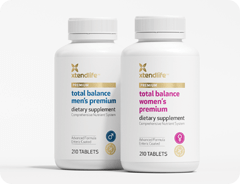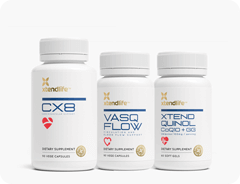Rather, he spends quality time with each of them, asking many questions about their medical background. Critically, he listens, and genuinely cares.
By doing this, he made an interesting discovery: more often than not, prescription drugs cause side effects which can look very similar to “aging”. So “Old age symptoms” can actually be a result of pharmaceutical drug side effects. Once the drugs are reduced or discontinued, and the body properly nourished, the degenerative symptoms often greatly reduce.
My colleague’s discovery is confirmed in the scientific literature which explains how pharmaceuticals may accelerate aging.
Let’s see how…and please, as you read this blog, consider if your ‘old age symptoms’ may be drug induced.
The Relationship between Aging and Pharmaceuticals
Research shows how a key side effect of some pharmaceuticals is that they can cause major cellular damage. They do this by attacking the mitochondria, the tiny energy generators in each cell of your body (ref. 1)
The researchers, J.Neustadt and S.R. Pieczenik state: Medications have now emerged as a major cause of mitochondrial damage, which may explain many adverse effects. All classes of psychotropic drugs have been documented to damage mitochondria, as have statin medications, analgesics such as acetaminophen, and many others.” Such medications cross the blood–brain barrier and can age brain cells. (ref. 1)
Why exactly do medications cause such mitochondrial damage?
One of the key reasons that these synthetic, man-made molecules cause aging is that mitochondrial damage shortens telomeres(ref. 2).
Telomere shortening prompts cells to go into repair mode to fix the shortened DNA and damaged mitochondria. All that repair activity appears to generate a lot of free radicals. These in turn cause oxidation, which may shorten telomeres even more. So the cycle continues.
Key Pharmaceutical Drugs Most Likely to Damage Mitochondria and Telomeres
In addition to the medications mentioned above, other drugs may directly cause mitochondrial damage, telomere shortening and general degeneration. Below are the drugs that seem to be key culprits, and the more natural alternatives you may wish to consider or discuss with your doctor.
Chemotherapy and Radiation
Chemotherapy and radiation drugs can be particularly harmful.
These drugs cannot discriminate between cancer cells and healthy cells; thus, they damage both types of cells potentially causing serious side effects. In so doing, they also slow down the activity of telomerase, the enzyme that repairs telomeres.
The authors of this study (ref. 3) state: “Telomeres and telomerase are known to be essential for regulation of cellular life-span and maintenance of genomic stability, and earlier studies have demonstrated that cancer patients who receive chemotherapy have shorter telomeres in their blood cells, indicating accelerated telomere erosion and a potential contribution of telomere loss to late side-effects.”
After the authors’ further research, they conclude: "Taken together, both chemotherapy and radiotherapy significantly impair telomere maintenance and function in normal human cells. Conceivably telomere dysfunction causes shortened life-span and genomic instability of normal human cells, and thereby contributes to tissue/organ damage and secondary malignancies in long-term survivors of cancer. "
There are now many less damaging and more natural treatments for cancer (ref. 4). These, in essence focus on variants of specialised diets, gentle exercise, massage, hypnotherapy, acupuncture and more. However, Chemotherapy and Radiation may still remain important options in some cases.
Corticosteroids
This is a family of anti-inflammatory medicines primarily used to treat arthritis, asthma or a skin rash.
Unfortunately, these drugs turn off your body’s natural repair and rejuvenation mechanisms, causing you to age more quickly. Therefore, you may wish to consider natural alternatives such as:
- For Asthma: Try daily breathing exercises, yoga, massage therapy, and Omega-3 fatty acids.
- For Eczema or Skin rash: Brief daily sun exposure and chamomile oil are can be very effective for some people.
- For Arthritis: The New Zealand Green Lipped Mussel has a proven track record of helping with discomfort and inflammation. It is arguably one of the most complete whole foods provided by nature. Even the minerals in the mussel closely mimic those found in healthy human blood! It also contains a natural form of glucosamine and chondroitin.
Beta blockers
Beta blockers block the action of the sympathetic nervous system of the heart, thus reducing stress on the heart. Therefore, they are mainly used to treat several types of heart related conditions. Despite their long term use, their effectiveness has now been cast in doubt. (ref. 5 )
Instead, please consider these natural options:
- CoQ10: Countless studies show the heart and systemic benefits of CoQ10 (Ubiquinol) to maintain health. (ref.6 )
- Garlic: This herb nNot only can this herb help to reduces triglycerides, which protects your heart, but it may also reduce diastolic blood pressure. Garlic can be a great addition to salads and other foods. (ref. 7)
- Hawthorn: This is the heart tonic of the ancients which appears to assist in relaxing blood vessels.
Bisphosphonates
The theory behind Bisphosphonates is that they stop the natural process which dissolves bone tissue, helping to maintain or increase bone density and strength, and reduced likelihood of osteoporosis.
In practice, however, recent research appears to show that Bisphosphonates, especially the drug Fosamax (ref. 8), may to do just the opposite: create old brittle bone more liable to fracture and breakage. The bone drugs like Fosamax, Actonel and Reclast work by damaging the cells that remove old bone. This disrupts natural bone remodeling so you get bones that are denser, but have weaker cells.
Before you take a bone drug, the key natural alternatives you may wish to consider to maintain bone health are:
- Natural Vitamin D:The D3 form of vitamin D – or even better, natural sunlight – helps to direct bone building in your body. Natural Vitamin D also helps toincrease telomere length (ref.9)
- Vitamin K2: This vitamin aids your bones’ absorption of calcium to help make them stronger. The other benefit of vitamin K2 is that it helps to boost mitochondrial health and, therefore, it may reduce the likelihood of telomere shortening.
Most medical experts are unlikely to consider ‘old age’ symptoms as a side effect of medical drugs. After all, many are taught that degenerative disease and symptoms are a ‘normal’ part of aging. They might even prescribe another drug to treat your aging “symptoms”!
Please carefully consider the information in this blog before you take it. We hope this helps in the quest for ‘aging gracefully and slowly’ without debilitating ‘old age’ symptoms!
References:
1. This article further explains how medication-induced mitochondrial damage and disease occurs http://www.ncbi.nlm.nih.gov/pubmed/18626887
2. This study shows how mitochondrial damage shortens telomeres http://www.plosbiology.org/article/info:doi/10.1371/journal.pbio.0050110
3. Chemotherapy and Radiation are shown in this study to have a severe negative impact on telomere functioning http://www.ncbi.nlm.nih.gov/pubmed/22728163
4. For an understanding of complementary cancer treatments please see http://www.lef.org/protocols/cancer/alternative_cancer_therapies_01.htm
5. This is a summary of the status on beta blockers, and the recent studies questioning their efficacy
http://www.newscientist.com/article/mg21628900.200-beta-blockers-are-busted--what-happens-next.html#.U_PGX2Mm3Dw
6. . For a summary of some key COQ10 studies please see the ‘More Information’ tab on our Premium Omega 3 supplement page http://www.xtend-life.com/supplements/omega-3/omega-3-qh-ultra
7. These sources show garlic’s heart health benefits
- http://www.biomedcentral.com/1471-2261/8/13
- http://www.ncbi.nlm.nih.gov/pubmed/11980131
8. The side effects of bone drugs like Fosamax are described here http://www.drugwatch.com/fosamax/
9. The relationship between Vitamin D and telomere length is reviewed in this study http://www.ncbi.nlm.nih.gov/pubmed/23660800


 Supplements
Supplements Bundles
Bundles









